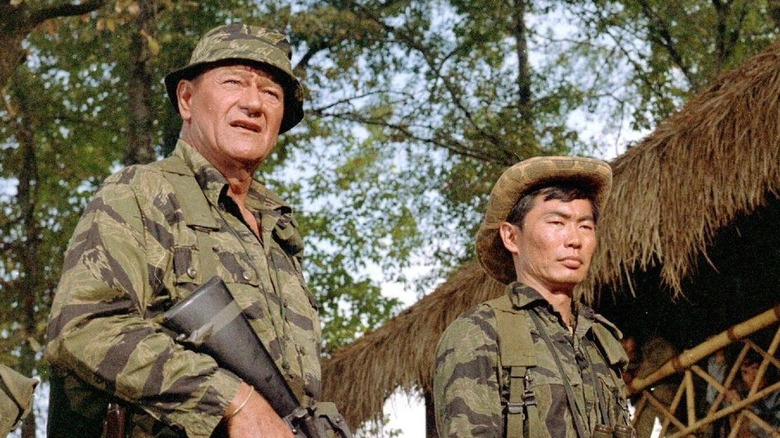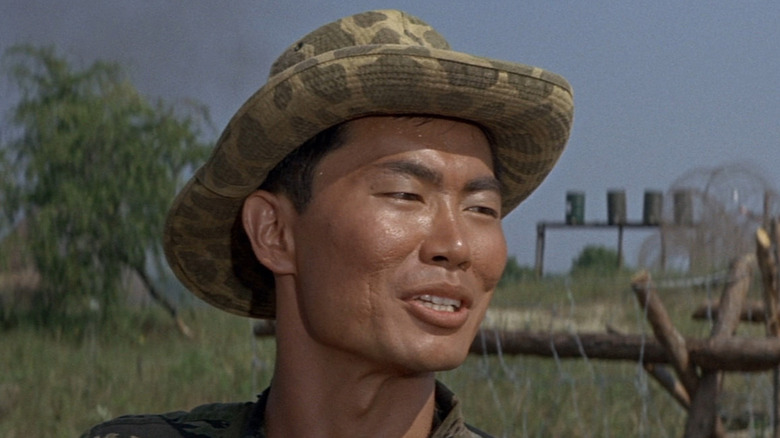How Star Trek's George Takei Felt About Working With John Wayne In Green Berets
Trekkies might have noticed that the helmsman of the U.S.S. Enterprise, Lieutenant Hikaru Sulu (George Takei), was absent from several episodes of the second season of "Star Trek." This was because Takei took some time off to shoot the 1968 war drama "The Green Berets," starring John Wayne, who also co-directed with Roy Kellogg.
"Green Berets" was trounced by critics. Most people loathed it. The drama was about the (then still active) Vietnam War, but it was presented like a sentimental World War II-era drama with "heroes" and "villains." Wayne, a star of multiple World War II movies, didn't seem to adjust his attitudes about war over the previous 20 years, thinking that his "brave American" shtick would still fly in 1968. He said once that "The Green Berets" was his attempt to remain apolitical about the Vietnam War, even though war is one of the singularly most political acts a human can engage in.
Roger Ebert infamously gave it zero stars, and Renata Adler, writing for the New York Times, called it "vile and insane." Oliver Stone has said on DVD commentaries that he wrote his 1986 Vietnam War movie "Platoon" as a direct rebuke of "The Green Berets."
"The Green Berets," despite its critical unpopularity, was a hit (though it's certainly not one of John Wayne's best). It was made for a then-large $7 million, and it ended up earning in over $32 million at the box office. That part must have chuffed Takei, who played the Vietnamese Captain Nghiem. When recalling the making of "The Green Berets," the "Star Trek" actor expressed a few regrets. In an interview with the Valley Tribute (transcribed by MeTV), Takei noted that his two-month hiatus stretched into a three-and-a-half-month hiatus because of shooting problems. He did note, however, that Wayne was friendly, and the big screen icon even admitted to watching "Star Trek."
George Takei was astonished by John Wayne's directing style
Takei recalls being astonished at the loosey-goosey fashion of Wayne's directorial style. He says that a lot of "The Green Berets" was improvised, as Wayne didn't like sticking to the script. The script was also tweaked a lot by the government. As Takei recalls:
"Working with John Wayne was really an experience in itself. With that project, it was not only a John Wayne 'Star,' but, it was produced by his company and the producer was his son, Michael Wayne. And the directors [were] John Wayne and Ray Kellogg. And although we had a script — because of the problems of being behind schedule, etc. — he threw out the script, and we were improvising as we went along."
It also seems that John Wayne was a Trekkie, or was at least familiar with "Star Trek," which is odd for a man with notoriously retrograde conservative values. Takei found that "Star Trek" was, in 1967, just popular enough to help him get his role in "The Green Berets." Indeed, Wayne called him "Sulu" on set. As Takei related it:
"I think 'Star Trek' played a small part [in getting me the role]. As a matter of fact, when we first started shooting, Wayne wouldn't call me 'George,' he would shout 'Where's Sulu?!'... The assistant director would come running up to my dressing room. 'Mr. Wayne wants Sulu!' But later on, he was calling me 'George.'"
It must have been nice to have a star of Wayne's stature not only recognize work that you were doing over on TV but also to be called by your first name thereafter. Of course, Takei might have felt a pang of ambivalence after a notorious 1971 interview Wayne had with Playboy Magazine emerged. Wayne said some horridly racist things that Takei, an actor of Japanese ancestry, likely would have been hurt by.

